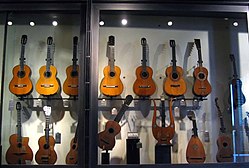
The following is a bibliography of classical guitar related publications. [1]
Contents
The classical guitar (also called the "Spanish guitar" or "nylon string guitar") is a six-stringed plucked string instrument from the family of instruments called chordophones. The classical guitar is well known for its comprehensive right-hand technique, which allows the soloist to perform complex melodic and polyphonic material, in much the same manner as the piano.